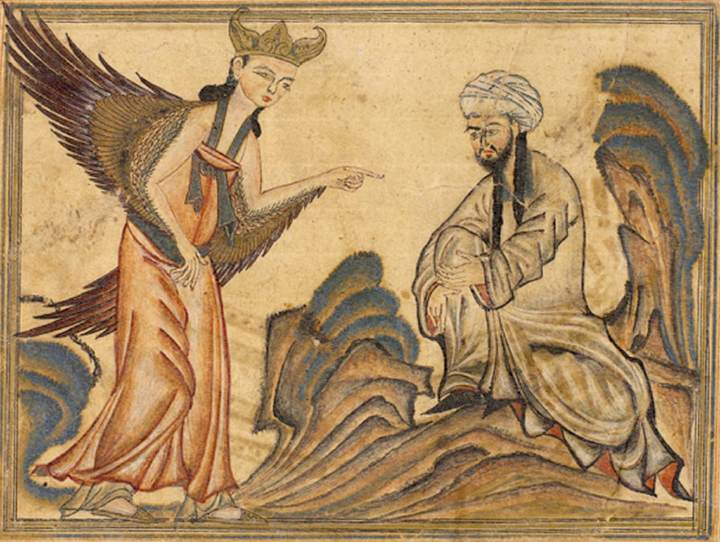Bride of Muhammad
Mother of the Believers is a title Muslims give to the wives of Muhammad. It best suits his first wife, Khadijah bint Khuwaylid. According to Islamic sources, Khadijah was a wealthy widow and Muhammad’s employer. Muhammad was twenty-five, and Khadijah was forty when She proposed to him. A woman proposing the marriage was odd indeed, given the time and place where it transpired. To Muslims, it is the ultimate proof that their otherwise misogynistic religion is very woman-friendly. The marriage between Khadijah and Muhammad was both happy and monogamous. When he was without Her on one of his journeys, Muhammad never had any desire for other women. They had six children, of which four daughters survived. Only after Khadijah had died did Muhammad marry other women.
Muhammad returned home shocked after the Archangel Gabriel appeared to him for the first time. He told Khadijah what had happened, trembling in all likelihood. She comforted him like a mother and supported him from then on. Khadijah’s moral support made Muhammad believe in his mission, and Her financial support was indispensable. Apart from a wife, Khadijah was thus like a mother to Muhammad, in the likeness of Eve and Adam. She was Muhammad’s boss in more than one way. Unlike the Bride of Christ, the Bride of Muhammad is in the records and hard to ignore. Women hardly ever were boss over their husbands in seventh-century Arabia. And if you see the larger picture, it is all too clear who She was.
Quran origins
The Quran lacks chronological order and repeats itself, so if you do not know its history, you might find it hard to believe that this scratchy collection of sayings is the word of God. Muslims claim the Quran was revealed to Muhammad by God, with the Archangel Gabriel being the intermediary. The first Muslims were illiterate, so they memorised the verses and did not write them down. Memorising such a lengthy text for decades is quite challenging. And the Muslims fought battles that took the lives of those who knew the verses.
The early Muslims likely split up the task of memorising the Quran and assigned multiple men to recall the same verses. How well they did that is anyone’s guess, but the outcome was what God intended, and it explains why the Quran is the way it is. Later, those who compiled the Quran did not attempt to edit or present them chronologically because humans should not distort God’s words. If only early Christians had shown that kind of respect for their scriptures, Christianity would have been an entirely different religion.
Historical analysis suggests parts of the Quran could come from Zoroastrian, Jewish and Christian sources. But other parts seem original and could have been whispered by that supposed angel into Muhammad’s ear. The Quran also adds a few juicy details to existing stories the Jews have failed to mention in their Bible, for instance, King Solomon gathering an army of ghosts, men and birds, entering the valley of the ants, and ants talking to each other (Quran 27:15-18):
Indeed, We granted knowledge to David and Solomon. And they said in acknowledgement, ‘All praise is for God Who has privileged us over many of His faithful servants.’
And David was succeeded by Solomon, who said, ‘O people! We have been taught the language of birds, and been given everything we need. This is indeed a great privilege.’
Solomon’s forces of ghosts, humans, and birds were rallied for him, perfectly organised.
And when they came across a valley of ants, an ant warned, ‘O ants! Go quickly into your homes so Solomon and his armies do not crush you, unknowingly.’
In virtual reality, these things can happen. We have no evidence, but some things are more plausible than others. Talking ants is as believable as a serpent talking to Eve. Muslims claim Muhammad was the last prophet before the End Times and that the Quran corrects mistakes and omissions in the Jewish and Christian scriptures. At first glance, that is not particularly convincing, but the Quran contains a few discrepancies that may make sense in hindsight:
- The Quran discusses Adam’s creation extensively but says little about how Eve came to be. The story of the rib is absent. Humans come from one soul, the Quran claims (Quran 39:6). The implicit assumption is this soul is Adam.
- The Quran does not blame Eve for the Fall. One account explicitly blames Adam (Quran 20:120-121). That might be a crucial element in the original message of Christianity that is missing nowadays.
- There is no original sin in Islam. The Quran says that Eve and Adam repented, and God forgave them (Quran 2:37, 7:23). The Quran never claims that Jesus was a redeemer for the sins of humankind.
- The Quran names Jesus the Son of Mary and confirms the virgin birth, thereby implying that Jesus had no father, and because Christians call him the Son of God, it opens up the possibility that God’s name was Mary.
- In the Quran, God orders the angels to prostrate before Adam, while the New Testament says that the angels must bow before Jesus, implying that Jesus could be Adam. The repeated mention could signal importance.
- Finally, the Quran stresses the return to Paradise many times. Our return to Eden gets little attention in the Jewish and Christian scriptures. The Quran mentions it so often that it could be of the utmost importance.
The Hidden Secret
The Quran claims that God is the greatest schemer (Quran 3:54, 7:99, 8:30, 10:21, 13:42) and capable of deception (Quran 4:88, 5:41, 11:34, 14:4). The existence of different religions and theological disputes is part of God’s plan. Otherwise, the message of Islam would have been more convincing. No one can be clever enough to uncover the underlying truth. And no one can be too dumb. After all, someone wrote the script. The Quran supposedly contains a hidden secret. Chapter 74 of the Quran is named The Hidden Secret or The Cloaked One. The cloaked man is Muhammad. The chapter further mentions that 19 angels guard hell. The conflating of cloak and hidden secret suggests a disguise. It says (Quran 74:31),
“We have made their number [that of the angels] only as a test for the disbelievers so that the People of the Book [Jews, Christians and Zoroastrians] will be certain, and the believers [Muslims] will increase in faith, and neither the People of the Book nor the believers will have any doubts, and so that those hypocrites with sickness in their hearts and the disbelievers will argue, ‘What does God mean by such a number?’ In this way, God leaves whoever He wills to stray and guides whoever He wills. And none knows the forces of your Lord except He. And this description of hell is only a reminder to humanity.”
Muslims believe it contains a clue proving the divine origin of the Quran. The verse implies that the number 19 has significance beyond the number of angels. In 1974, a guy named Rashad Khalifa claimed to have discovered a mathematical code hidden in the Quran based on the number 19. It gave rise to a numerological cult and countless films on YouTube. Numbers are usually meaningless. But the number 19 appears in the chapter named Hidden Secret. Hence, the number 19 may have significance, and the rise of the cult may not be an accident. What could the hidden secret be? Chapter 19 is named Mary, and it is about the Virgin Mary. The hidden secret may be that God’s name was Mary, something only God could know. The cloak may refer to God appearing to be a man while being a woman or the Virgin Mary being the cloak hiding the identity of God.

Virgin birth
The Quran corroborates the virgin birth of Jesus (Quran 4:171), thus implying Jesus had no father. The virgin birth is the miracle of the mother goddess. Christians might have invented that tale to refer to Adam as Eve’s son. The Quran consistently names Jesus the Son of Mary (Quran 2:87, 4:171, 61:6), while Christians call him the Son of God. The Quran claims God has no children and that Jesus was not God’s son either (Quran 6:100-102, 17:111, 18:4-5, 19:88-92). The reason likely is that the Meccan supreme deity Allah had a wife and children before God claimed this title. And the Virgin Mary was not God either. The repeating of the phrase Son of Mary suggests importance. It stresses that God is not Jesus’ father, and it may imply that God’s name was Mary.
As mentioned before, the star and crescent became the symbol of Islam. This symbol has a long history predating Islam, as it was associated with a Moon goddess. The moon represents the woman, and the star the child (Genesis 37:9). Hence, the Islamic symbol is like the Madonna with the child Jesus or the relationship between Khadijah bint Khuwaylid and Muhammad. She was fifteen years older and could have been his mother. Son of God thus means Son of Mary as Mary Magdalene was God. The picture that goes with it is the Madonna with the child, represented in the crescent with a star, the symbol of Islam.
Return to Eden
Muslims believe Jesus will return in the end times (Quran 4:159, 43:61). Even more crucial is our return to Eden, only sparsely mentioned in the Jewish Bible (Ezekiel 36:22–38) and the New Testament (Revelation 22:1-5). The Quran refers to Eden 147 times, or 3 * 7 * 7 if you’re into numbers with religious significance, using terms like Gardens and Paradise. It supposedly is the final destination of the righteous believers. It refers to Eden as the phrasing refers to providing fruits of that garden and having spouses. Genesis claims God created the woman to accompany the man and that Eve and Adam could eat all the fruits except from that one tree. For instance (Quran 2:25):
And give good tidings to those who believe and do righteous deeds that they will have gardens [in Paradise] beneath which rivers flow. Whenever they are provided with a provision of fruit from there, they will say, ‘This is what we were provided with before.’ And it is given to them in likeness. And they will have therein purified spouses, and they will abide therein eternally.
Our return to Eden is a central theme in the Quran, while the Jewish Bible and the Gospel hardly mention it. The repeating implies importance. It concerns the nature of our journey from the Garden of Eden to the Final Gardens of Paradise. The Jews wrote most of their Jewish Bible during their exile in Babylon and shortly after. They returned and interpreted their journey from the depraved city of Babylon to God’s city of Jerusalem. The Christians took over this theme, and their Babylon became Rome. If Jesus was Adam reincarnated and is to return, our final destination could be Eden, the Final Gardens of Paradise. Perhaps Eden stands for simple living, while Babylon represents advanced civilisation rather than evil.
Latest revision: 11 November 2023
Featured image: top small written Arab phrase “Umm ul Muminin”(Mother of the believers) then in centre Big written “Khadijah” and bottom small written Arab honour phrase ‘Radhi allahu anha.’




